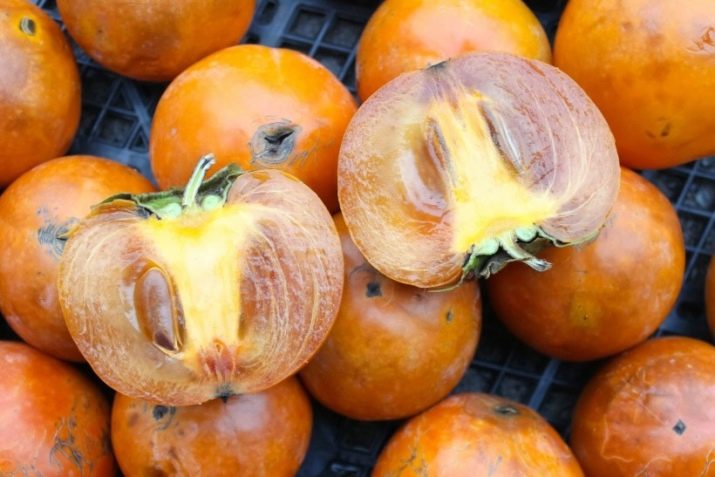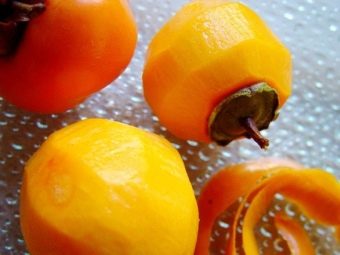The benefits and harms of persimmon during pregnancy

Pregnancy is a period when the female body experiences increased loads, vitamins and micro-macro elements help, which ideally should come along with food to cope with them.From this point of view, persimmon becomes especially beneficial for the health of the future mother and child.
Composition and calorie
As part of persimmon contains many vitamins, which causes its tonic, firming effect. There are vitamins A, E, PP, as well as vitamins of group B and ascorbic acid.
High content in the fruits of magnesium and potassium, iron, iodine, calcium. There are tannins (they provide a specific, tart taste of persimmon), tannins and organic acids, pectins and dietary fiber.
Fruit pulp cannot be called high-calorie, its nutritional value averages 62-66 kcal per 100 g of product and may vary slightly depending on the variety. The bulk of the fruit falls on water, high in carbohydrates, and protein and fat are present in much smaller amounts. The glycemic index is average and is equal to 70.
The sweetness of persimmon is caused by a large amount of sugars - it is sucrose and fructose, their content is almost the same. Quite a lot in fruit and fiber - persimmon contains 2 times more dietary fiber compared with apples.
What is useful?
It is not surprising that having such a rich composition, persimmon is useful for women during pregnancy. At this time, the woman's body becomes more vulnerable to diseases, environmental factors. It is due to the high content of vitamins can strengthen the immune system. An important role is played by ascorbic acid, which has a pronounced cough, immunostimulating action.
Persimmon should be consumed during the flu and colds season, as well as at the end of winter to avoid vitamin deficiency. Adequate intake of vitamin C in the first trimester of pregnancy should be ensured, as it is involved in the formation of the ovum and placenta.
It is important that persimmon contains many components involved in the synthesis of female sex hormones - these are vitamins A, E, iodine. The hormones produced are responsible for the menstrual cycle. Their lack leads to problems with conception and carrying the fetus.
Carotene, or vitamin A, is also necessary for the formation of the neural tube of the fetus and some of its other organs. For mom, it is useful in helping to maintain visual acuity, especially at night, improves skin elasticity. The latter property is important because it prevents the formation of stretch marks in the chest, abdomen, and thighs.
Vitamin PP, as well as antioxidants (vitamins C and E) increase the elasticity of vessel walls and capillary permeability. This is very important during pregnancy, since the volume of circulating blood increases by almost 2 times, which entails the corresponding loads on the vessels.
In addition, the consumption of persimmon can reduce the level of "bad" cholesterol, to avoid clogging of blood vessels with cholesterol plaques. The latter, like high cholesterol, cause excessive stress on the heart, a violation of the elasticity of blood vessels and, as a result, varicose veins. Finally, this vitamin prevents the threat of placental insufficiency.
Persimmon is rich in iron, therefore, is a product that increases hemoglobin levels. Iron deficiency anemia is one of the frequent troubles that accompany pregnancy. The blood in this case is not sufficiently saturated with oxygen, which means that the organs and tissues also experience oxygen starvation and nutritional deficiencies.
Anemia is fraught with a deterioration in the condition of a woman - a decrease in pressure, weakness, dizziness, and lack of appetite. During pregnancy, anemia becomes especially dangerous, since the fetus also suffers from a lack of oxygen (hypoxia), which can cause a number of unpleasant consequences, ranging from entanglement by the umbilical cord and ending with fetal death. Anemia is also a cause of premature labor, miscarriages, and underdevelopment of the fetus.
As already mentioned, during pregnancy, the heart has to pump a greater volume of blood, so potassium and magnesium, also available in persimmon, turn out to be most welcome. They strengthen the heart muscle, normalize the rhythm. Due to such a positive effect on the cardiovascular system, the woman's breathing is normalized (shortness of breath is eliminated at later periods), pressure, and the conductivity of the heart muscle is improved, which allows for a greater supply of oxygen to the child.
Potassium also refuses the anti-edema action, allows to remove excess moisture from the body. And due to the presence of sodium, even if the removal of unwanted fluids from the body does not form a deficit or excess of salts. In other words, persimmon helps to maintain the water-salt balance.
Magnesium removes increased muscle tone, including the uterus. The hypertonus of the latter, as is known, causes miscarriages in the early stages and premature births in the second and third trimester.
Another important element in the composition of the fruit is iodine, necessary for the functioning of the thyroid gland and the brain. It is necessary for the production of sex hormones (and their lack, as we have already found out, leads to the termination of pregnancy) and participates in the formation of the bone and nervous systems of the fetus.
Pregnant women should increase calcium intake. It is necessary not only for the skeletal system and the teeth of the future mother, but also for the fetus. Lack of calcium leads to congenital abnormalities, increases the risk of rickets. Persimmon contains a sufficient amount of calcium, and due to the presence of vitamin C in its composition, the body absorbs calcium better.
B vitamins have a positive effect on the nervous system of a pregnant woman. The waiting time of the baby is often accompanied by feelings, the load on the emotional sphere increases, hormonal changes. All this can negatively affect the state of the mother and child.
Vitamin B relieves nervous tension, has a mild relaxing effect, not depressing the central nervous system or provoking drowsiness. The fruits will help relieve the symptoms of chronic fatigue, which is often observed in the first trimester of pregnancy, when a woman is usually forced to combine pregnancy and professional activity, to normalize sleep.
Tannins and organic acids improve the digestion of food, which means that it brings more benefits to the body. They stimulate the production of gastric juice, so even heavy food is absorbed faster and better by the body.
Dietary fiber improves intestinal motility, and also remove toxins and slags. This helps to improve metabolic and lipid metabolism, allows you to get rid of the feeling of heaviness after eating.
Thanks to fiber and pectin, persimmon exhibits a mild laxative effect. It will help get rid of constipation, which also often occurs during pregnancy.
In addition, the acidic savory taste of the fruit allows you to remove toxicosis. Persimmon gives a feeling of fullness, but it has a low calorie content. With moderate consumption, this fruit will keep you fit, improve digestion and prevent excessive weight gain.
Water in the fruit also has a cleansing effect, removes toxins and improves intestinal motility. It is necessary for the washing of organs and systems, the prevention of thrombosis. Biologically active flavonoids and tannins exhibit bactericidal and wound healing effects.
Persimmon during pregnancy can be used as an external tool for body and hair care. Gruel out of it helps prevent the formation of stretch marks, struggles with pigmentation, excessive dryness or, on the contrary, increased greasiness of the skin. With regular use of a persimmon mask, elasticity and skin tone are increased, and healthy radiance returns.
Contraindications
Despite the many healing properties, with intolerance persimmon she will bring only harm. Allergy to persimmon - one of the primary contraindications to its use. It is important to remember that due to changes in hormonal levels during pregnancy, allergies to familiar foods may develop.
Even if the persimmon did not provoke negative reactions before the “interesting situation”, this can occur during pregnancy. In this regard, to begin to include fruit in the diet should be with small doses, watching the reaction of the body.
High sugar content requires careful introduction of it into the diet with diabetes. With type 2 diabetes, it is allowed to consume a small amount (50 g per day) of persimmon. The high level of sugars makes persimmon an undesirable product with excess weight. And with obesity type 3 and completely prohibited.
Despite the positive effect of persimmon on the digestive tract organs, it cannot be eaten during the period of exacerbation of inflammatory diseases of this system - with gastritis, ulcers, and diseases of the pancreas. Even in the period of remission in this case, it is recommended to remove the skin from persimmon before use.
The cause of failure are also diseases of the urinary system, urinary tract. Persimmon has a laxative effect, but when it is large in the stomach between tannins and gastric juice, reactions begin to occur, leading to intestinal obstruction.
With a tendency to constipation, diarrhea or intestinal obstruction can not eat persimmon.
Terms of Use
Obtaining from eating persimmon only benefit will help compliance with the daily dosage. In the absence of contraindications, pregnant women are allowed to eat no more than 1 persimmon 2-3 times a week. It is better to pre-remove the skin from the fetus, thus freeing it from tannin. This will remove the viscosity of taste and eliminate the possibility of constipation and intestinal obstruction.
It is important to choose the right fruit. If you are afraid of allergies, then give up sweet varieties, preferring sweet and sour. Reddish skin and flesh usually signal high sugar content.
It is useful to pay attention to the content in a particular grade of tannins. The latter provoke active intestinal peristalsis, which can cause uterine hypertonus, and in later periods, and the onset of labor. The least amount of tannin is contained in the Korolek variety. It is also less likely to cause allergies and is devoid of excessive cloying.
The most useful will be persimmon during its biological ripening - from the second half of October to the end of December. If the seller offers persimmon at a different time of the year, the likelihood of buying fruits “stuffed” with nitrates and growth accelerators is high.
Ripe berries should have a transparent skin, uniform color and dark brown spots or stripes on the surface. The latter are a sign that the fruit is ripe. The flesh should be soft, but firm, not spreading out with a slight pressure.
Consumption, especially during pregnancy, of fruits with signs of rot and green fruit is unacceptable. The same applies to fruits with damaged skin - in such fruits fermentation begins, and in addition, the damaged skin becomes the “entrance gate” for pathogenic bacteria.
To freeze a persimmon for the future, and also the freezing helps to get rid of the knitting taste. Fruits should be placed in the freezer and reach as needed. It is not allowed to re-freeze and thaw them. This will not only spoil the taste of the fruit, but also cause the destruction of vitamins and other useful elements. In the freezer persimmon should be stored no more than 6 months.
Persimmon can be eaten fresh as a separate dish or as part of salads, side dishes. You can cook from it jam or compote, jelly, cocktail. It is important to remember that during long cooking persimmon loses its use, so the recipes should assume its short-term and minimal heat treatment.
When eating fruits as a snack you need to remember that they stimulate the appetite. If you are inclined to corpulence, then this consumption of persimmon is best avoided.
For more information about the benefits and dangers of persimmon, see the following video.


































